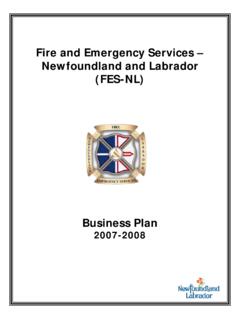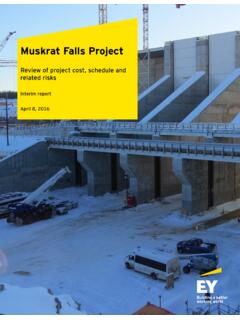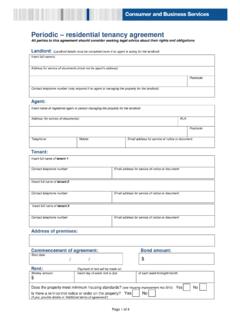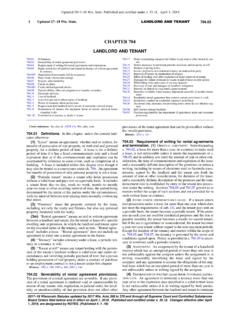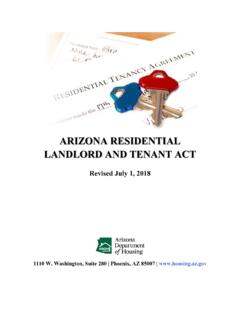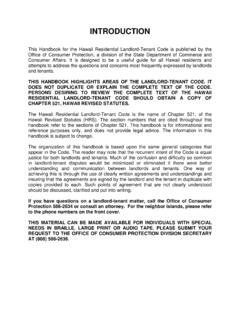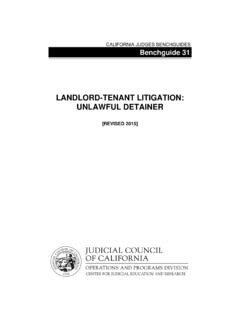Transcription of A Guide for Landlords and Tenants in
1 January 1, 2019 A Guide for Landlords and Tenants in Newfoundland and Labrador Residential Tenancies Office This Page Intentionally Left Blank A Guide for landlord and Tenants in Newfoundland and Labrador Table of Contents Introduction .. 1 Rental Agreement .. 3 landlord Must Provide Documentation .. 4 Tenant May Withhold Rent .. 4 Types of Rental Agreements .. 5 Periodic Term .. 5 Fixed Term .. 6 Security Deposit .. 7 Maximum Amount .. 7 Receipt Required .. 8 Return or Retain .. 8 Interest .. 8 Statutory Conditions .. 9 Obligation of the landlord .. 9 Obligation of the Tenant .. 9 Assigning or Subletting Premises .. 9 Mitigation on Abandonment .. 9 Entry of Residential Premises .. 9 Entry Doors .. 10 Peaceful Enjoyment and Reasonable Privacy .. 10 Disconnection of Services .. 10 Other Terms and 11 Pets .. 11 Cannabis .. 11 Material Term.
2 12 Requesting Repairs .. 13 Tenant Request for Repairs .. 13 landlord Request for Repairs .. 13 Increasing Rent .. 15 Frequency of Increase .. 15 Amount of Increase .. 15 Notice Period .. 15 Sublet or Assignment .. 17 Sublet .. 17 Assignment .. 18 Termination Notice - Standard .. 19 Notice Period .. 20 Termination Notice Special Circumstance .. 21 Termination Notice - Cause .. 23 Non-Payment of Rent .. 24 Material Breach of Rental Agreement .. 24 Premises Uninhabitable .. 25 Failure to Keep Premises Clean or Repair Damage .. 25 Interference with Peaceful Enjoyment or Reasonable Privacy .. 26 Termination for Family Violence .. 29 Application for Termination .. 29 Certificate and Termination Notice .. 30 Confidentiality .. 30 Abandonment of Residential Premises .. 31 Serving Notice .. 33 Counting the Number of Days Notice .. 34 Personal Possessions .. 35 Dispute Resolution.
3 37 Mediation Services .. 37 Adjudication .. 37 Remedies .. 38 Decisions .. 39 Appendix A .. 41 Standard Rental Agreement Tenant s Request for Repairs landlord s Request for Repairs landlord s Notice to Increase Rent Tenant s Notice to Terminate Standard landlord s Notice to Terminate Standard Tenant s Notice to Terminate Special Circumstance Tenant s Notice to Terminate Cause landlord s Notice to Terminate - Cause Tenant s Application to Terminate Family Violence landlord s Notice of Abandonment Application for Substituted Service Application to Dispose of Personal Property Application to Sell Personal Property Application for Dispute Resolution This Page Intentionally Left Blank 1 Introduction Residential Tenancies Act 2018 The purpose of the Residential Tenancies program is to protect residential Tenants and Landlords by providing.
4 Information on their rights and obligations under the Residential Tenancies Act; and an effective and efficient dispute resolution services through mediation and adjudication. This Guide provides general information about the Residential Tenancies Act, 2018 and Regulations as well as the process of dispute resolution offered by the Residential Tenancies program. It is essential for both Landlords and Tenants to understand their rights and responsibilities so that they each make informed decisions and take appropriate action when a dispute between the parties arises. Additional information on Residential Tenancies is available through the following resources: Website: Email: Telephone: 709-729-2608 Toll Free in NL: 1-877-829-2608 Office Locations Avalon Region - Motor Registration Building, 149 Smallwood Drive, Mount Pearl, NL, Box 8700, St.
5 John s, NL, A1B 4J6 Eastern & Central Region - Government Service Centre, Fraser Mall, 230 Airport Boulevard, Gander, NL, Box 2222, Gander, NL, A1V 2N9 Western Region - Sir Richard Squires Building, 84 Mount Bernard Avenue, Corner Brook, NL, Box 2006, Corner Brook, NL, A2H 6J8 2 This Page Intentionally Left Blank 3 Rental Agreement RTA 2018: Section 7 The Residential Tenancies Act (RTA) defines the rental agreement as a written, oral or implied agreement between a landlord and a tenant in which the tenant is granted the right to use or occupy residential premises on the condition rent is paid. Every rental agreement must include the information required in the standard rental agreement. Where an oral or implied rental agreement is entered into, the landlord is required to provide the tenant with a written form of the oral or implied agreement in a standard rental agreement form which must include the following.
6 The correct legal names of the landlord and tenant the telephone number, electronic address and civic address of the landlord where documents may be received, delivered or served by the tenant (section 7(7)(a)) the telephone number, electronic address and civic address of the landlord s agent where documents may be received, delivered or served by the tenant (section 7(7)(b)) telephone and electronic address of the tenant where documents may be received, delivered or served by the landlord the civic address of the rental unit the date the rental agreement was entered into the statutory conditions identified in section 10 of the Act the date the tenancy starts the type of rental agreement: (i) week to week; (ii) month to month; (iii) fixed term the termination date of a fixed term tenancy the amount of rent payable for a specified period the day in the specified period ( week, month) on which rent is due; the other terms and conditions including services, furnishings and other equipment or facilities included in the rental agreement the amount of any security deposit paid the date on which any security deposit was paid A standard rental agreement form is located in Appendix A and identified below for Landlords or Tenants to use and customize to meet their needs.
7 Form: Standard Rental Agreement 4 landlord Must Provide Documentation Once a rental agreement is entered into, the landlord is required to provide the tenant with the following within 10 days after the rental agreement is entered into: a copy of the Residential Tenancies Act; and a copy of any written rental agreement or documentation of a verbal agreement containing the information required in the standard form rental agreement. Tenant May Withhold Rent Where a landlord does not provide the tenant with a copy of the written rental agreement or the written notice of a verbal rental agreement, the tenant may withhold rent until the documents are provided. Once the landlord provides the documents to the tenant, then all rent owed by the tenant is payable to the landlord . 5 Types of Rental Agreements RTA 2018: Section 8 The Residential Tenancies Act (RTA) restricts the types of rental agreements that are permitted.
8 A periodic rental agreement refers to an agreement that recurs on a regular basis with no end date. A fixed term rental agreement refers to an agreement that has a defined start and end date. Knowing the type of rental agreement entered into as well as the start date of the agreement is important because different types of rental agreements have different notification periods for ending the agreement. Periodic Term A periodic term rental agreement can only be either week to week or month to month. The start of the agreement can be on any day of the week or month that is agreeable to the landlord and tenant. For example, in the chart below, Jane s week to week agreement extends from Tuesday of one week to Monday of the following week. Each Tuesday, Jane s rental agreement automatically renews with rent payable every Tuesday. Jane s Week to Week Rental Agreement Sun Mon Tue Wed Thu Fri Sat 1 2 $$$ 3 4 5 6 7 8 9 10 11 12 13 14 15 16 17 18 19 20 21 In a month to month agreement, the month may be defined from the first to the last day of every month and renew automatically on the first of each month with rent payable on that day.
9 However, as shown in the table below, it is also acceptable for the month to start on any day of the month. For example, in the table below, Phil s month to month agreement starts on the 3rd and extends to the 2nd of the next month. Such an agreement would automatically renew on the 3rd of each month with rent payable on that day. Phil s Month to Month Rental Agreement Sun Mon Tue Wed Thu Fri Sat 1 2 $$$ 3 4 5 6 7 8 9 10 11 12 13 14 15 16 17 18 19 20 21 22 23 24 25 26 27 28 29 30 1 2 3 4 5 6 Any periodic agreement that is less than one week will be treated under the RTA as a week to week agreement. Similarly, any periodic agreement that is more than one week and less than six months will be treated under the RTA as a month to month agreement. Fixed Term A fixed term rental agreement cannot be less than 6 months and not more than 12 months. Any fixed rental agreement that is signed for a period extending beyond 12 months will be treated by the Residential Tenancies Act as a fixed term for the first 12 months and then treated as a month to month thereafter.
10 7 Security Deposit RTA 2018: Section 14 A security deposit is often called a damage deposit . It refers to the money paid by a tenant to a landlord who have entered into a rental agreement. This money is held by the landlord as a type of insurance in the event the tenant causes the landlord to suffer some type of financial loss. A security deposit is different from a holding deposit . Before entering into a rental agreement, a landlord may require a potential tenant to pay a deposit to hold a rental property while the Tenants make up their minds on whether or not to rent the property. Often in this situation, a holding deposit is not refundable because the landlord may stop advertising the property or decline other offers to rent until the person who paid the holding deposit makes a decision. The payment or refund of a holding deposit is not regulated under the Residential Tenancies Act because a rental agreement has not yet been entered into and there is no landlord tenant relationship established.

